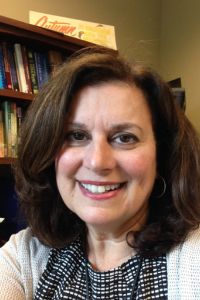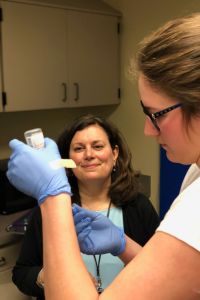Doctoral graduate in educational evaluation and research Stephanie Gilkey develops first summative evaluation to help physician assistant studies programs assess student professionalism

For more than 40 years, Stephanie Gilkey ‘23 has been a physician assistant (PA). She has worked in many settings, including Henry Ford Health System, Harper Hospital and the Wayne State University Eugene Applebaum College of Pharmacy and Health Sciences, where she helped develop the PA program and spent more than 20 years serving in various roles, including program director and academic coordinator.
Led by a desire to become a better educator and to understand and conduct educational research, Gilkey began the doctoral program in educational evaluation and research in the Wayne State University College of Education.
“PA programs graduate clinicians,” she said. “We learn how to practice medicine, but we don’t learn how to educate other clinicians. Understanding how to educate others is an important part of furthering our own profession. However, my focus has been on research. I wanted to learn more about education, evaluation and research because I'm an educator — I have a master’s in education — and when I was reading educational research, I often found that I didn't understand it. I really wanted to know more about it, understand it and learn how to conduct it in a way that was proper, logical and really contributed to physician assistant education.”
Gilkey — who was born in Detroit and has one sister who graduated from Wayne State's College of Nursing and another who earned a master's from Wayne State's College of Education — said she explored other programs but ultimately chose Wayne State for several reasons.
“When I began the program, I was a Wayne State employee, and it made sense to get my degree where I worked,” she said. “The College of Education has an excellent reputation. I knew others who had gone through the program, I knew it was a rigorous course of study, and I figured if I could make it through, I would learn a lot. I also wanted a more traditional experience in class — not an online one.”
Gilkey said completing the program took her longer than she anticipated because of an unexpected diagnosis and a sudden death.
“In the middle of the program, I was diagnosed with breast cancer,” she said. “I took a year off to manage that. Then, I had four surgeries in one year.”
Gilkey returned to the program, finished her coursework and passed qualifying exams. While she was writing chapter two of her dissertation, Professor Shlomo Sawilowsky, her advisor, died.
“I had numerous classes with him, and we had talked in depth about my dissertation,” Gilkey said. “When he died suddenly, I had to go back to the drawing board while grieving his loss. It took several months to get a new committee and make sure they approved of what I was doing. It was almost a year before I got back on track.”
Gilkey said she appreciated her new committee members for their understanding, flexibility and support.
“My new advisor, Do-Hong Kim, and committee members — Sara Maher from WSU Applebaum and Elizabeth McQuillen from the College of Nursing — were wonderful and very supportive,” she said. “I kept the same topic, but I had to change part of the methodology. It worked out well because now I can generate two articles from my dissertation.”
Gilkey developed a summative evaluation that PA programs can use to determine whether students have learned a series of professionalism traits they are expected to exhibit by the end of the degree program. Next, she plans to develop a formative evaluation to assess students as they progress through a PA program.
“It is something that no one has done for PA education yet, so it is pretty cool,” she said. “I had an incredible response — 350 participants. A couple of experts and I did an exploratory factor analysis, then tested the tool. We created something very usable for PA programs.”
Gilkey appreciates the relationship she developed with Kim.
“I had never met Dr. Kim until she suddenly became my advisor,” she said. “She is extremely bright and a lovely person. She very quickly got up to snuff, was always available and guided me in a knowledgeable way. In fact, we are writing some papers together. I am grateful to her.”

Five years ago, Gilkey left Wayne State to develop and direct a PA program at the University of Michigan-Flint. She said the knowledge and skills she obtained in class proved helpful.
“I took a few classes in learning design and technology during my doctoral studies,” she said. “I was taking the design thinking course while I was developing the PA program, and I created five different personas and thought about what their needs would be. It was eye-opening. I learned an awful lot from all my classes.”
Gilkey said she is excited about applying what she has learned in her current role.
“I chose to pursue an Ed.D. instead of a Ph.D. because of the emphasis on the practical application of knowledge,” she said. “Now, I feel extremely comfortable reading research, understanding what it means and being able to decide which studies are well done. As educators and clinicians, we need to understand research and use it to make evidence-based decisions rather than intuitive ones.”
Gilkey said she doesn’t take anything for granted and is excited about the future.
“This has been an incredible experience, and I am extremely grateful I had this opportunity,” she said. “I didn’t expect to get cancer, and I didn’t expect my advisor to die, but setbacks happen. I did what I needed to overcome them. That makes me ‘Warrior Strong.’ Despite these experiences, I have earned the highest degree I possibly can in my field. When you talk about lifelong learning, this is the epitome of that.”